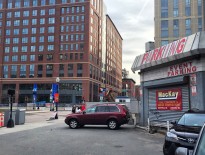It’s good to live in Massachusetts. If you like good food, good music, good sports, we’ve usually got you covered.
If you’re into breathing, we’ve definitely got you covered.
In general, historically it has been good to live in Massachusetts if you care about the environment, and about innovations in clean energy. I always knew this to be a central facet of our sociopolitical identity, but it changed for me from some lofty, chip-on-the-shoulder commonwealth curio to a serious local vocation when I attended a “power dialogue” at Boston University earlier this week.
The forum featured State Sen. Marc Pacheco and Massachusetts Department of Environmental Protection Commissioner Martin Suuberg, who outlined the past and future of our energy infrastructure, including implementation of the federal Clean Power Plan.
Now, it’s no surprise that Massachusetts is in a prime position to be a star when the Supreme Court (hopefully – and hopefully soon) takes its collective foot off the brake and allows full implementation of the Obama administration’s roadmap to reducing carbon pollution from power plants and ramping up our renewable energy industry to be more on par with other developed nations. We have always been at the forefront, as the speakers described based on decades of firsthand experience, of implementing federal regulations such as the Clean Air Act and Clean Water Act. We passed our own Global Warming Solutions Act in 2008, and are a member of RGGI, a market-based cooperative between Northeastern and Mid-Atlantic states that allows said states to sell allowances of carbon emissions to the power sector, then use proceeds to invest back in that power sector in a progressive direction. All this has created a $10 billion clean energy economy here, worth 2.5 percent of our gross state product, according to Pacheco, which has in turn made us all healthier.
So we’re good, right? Check energy off the list and carry on.
A mistake.
“We’re not on track to meet the requirements in the statutes that we’ve passed,” Pacheco said, leaving complacent Bay State tree huggers reeling. “The only way we’re going to do that right now is with some clean imported energy, much more lowering of our demand for energy, much more with energy efficiency and much more with solar.”
And so I, as a young citizen of the commonwealth, am now faced with a daunting reality: Growing up here it always was just a truism – we’re Massachusetts, we’re the clean energy, clean environment people. But as the energy game nationwide gets more serious, states like California, New York, Maryland and others are beginning to surpass us.
The truth is that to be, and stay, among the clean energy elite, it takes work by everyone. That includes us long-time citizens (turn off the lights, and email your reps!), but also the newcomers.
Hello, GE.
I asked Suuberg if a dialogue had yet begun with the company on exactly what kind of impact, positive or negative, the tech giant’s presence here would have on our environment and energy future. It has not yet, he said, though he was optimistic about the example that the company could set by adhering to environmental regulations during their massive relocation project.
I would like to take this dialogue a step further at this early point in the arrival of the new kid on the block (literally, writing from the B&T office in Fort Point, within smelling distance from the location of what will be the sparkling new GE headquarters).
Sure, you promise not to use all our energy, pollute the air or dirty the water (although we do love that, apparently). That’s obvious – that’s the law.
But I ask what more GE will be bringing to the table in order to help make Massachusetts a better place. Already there have been protests to the financial incentives that helped to bring the company here, which may have been better spent on schools, transit or, you guessed it, environmental initiatives.
To put it plainly, I believe that if GE wants to win the hearts and minds of the people of Massachusetts, it ought to make a serious and public effort to help us reach the environmental goals that we have set for ourselves. Be part of the solution to what many believe is the greatest threat to mankind, in a place where that solution lives already.
This means bringing innovations in clean power, such as solar and wind, to the forefront of its Massachusetts operations. So far, emphasis has been on life sciences, robotics, digital and other areas keenly in tune with the startup stylings of this neighborhood.
These are of course important areas in which I support advancement, but I will be keeping a special eye on what role our latest and greatest corporate citizen plays in our rich environmental history.
Help us help ourselves, and the world.








